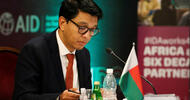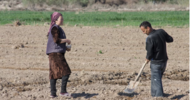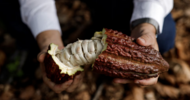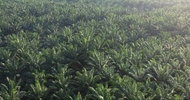Ethiopia announced on Friday plans to lease 100,000 hectares of land both to local and foreign investors, despite recent reports that foreign investors were grabbing large chunks of land.
- The Africa Report
-
28 September 2012
The Liberian government has leased nearly 6 per cent of Liberia’s total land mass to palm-oil companies. More than a million people live on those lands, and 150,000 will be affected in the first five years of the plantations.
- Globe and Mail
-
27 September 2012
We are witnessing a second scramble for Africa and other poor countries by rich nations and agribusinesses to acquire land for agricultural and biofuel purposes.
- Centre LSD
-
27 September 2012
Ethiopia Sugar Corp. said it’s signed agreements with state-owned China Development Bank Corp. for $500 million in loans to build two refineries, part of a plan to boost output of the sweetener almost tenfold by 2025.
- Bloomberg
-
26 September 2012
BHO Bioproducts, a closely held farming company, said it plans to invest more than $120 million in rice and cotton production on 25,000 ha in Ethiopia’s western Gambella region during the next four years.
- Bloomberg
-
25 September 2012
Anuak indigenous people from Ethiopia’s Gambella region submitted a complaint today to the World Bank Inspection Panel implicating the Bank in grave human rights abuses perpetrated by the Ethiopian Government.
One of the greatest threats Africa has ever faced is the impact from this new phenomenon of land-grabbing
- AllAfrica
-
21 September 2012
Saudi Arabia has invested around 40 billion riyals in agricultural and livestock projects in the Ukraine, Brazil, Argentina, Canada and Sudan, says chairman of the agricultural investment committee at the Saudi Council of Chambers.
- Arabian Business
-
20 September 2012
The Ethiopian government says that it will no longer impose export quotas on commercial farm outputs and processed goods as a part of its commitment for the new partnership introduced by G-8 countries that focuses on facilitating private sector investment in African agriculture.
- Addis Fortune
-
16 September 2012
Rising populations and the development of biofuels are increasing demand for arable land all over the world, and Arrianna Marie Conerly Coleman says that small farmers are the first to suffer.
- Future Challenges
-
13 September 2012
Investments in industrial scale agriculture must balanced by equitable flow of benefits to smallholder farmers
- The Star
-
12 September 2012
China’s growing agribusinesses and demand for soybeans and meat is bringing intensive farming and the risk of further deforestation in Brazil and beyond. Tom Levitt reports.
- Chinadialogue
-
10 September 2012
An Ethiopian farmer could sue the UK government after claiming a project that received funding from Britain led to the eviction from his farm and human rights abuses.
Soy farming in Argentina is often linked to land-grabbing and displacement of small-scale farmers. Aid organizations are demanding action from German Agriculture Minister Ilse Aigner during her trip to South America.
The Ethiopian military responded to an attack on a farm in Gambella region owned by Saudi Star Agricultural Development Plc with arbitrary arrests, rape, and other abuses against scores of local villagers, says Human Rights Watch.
The arid nation of Namibia has a newly discovered aquifer called Ohangwena II, that spans its northeast region, which flows under the boundary between Angola and Namibia, and now the challenge of balancing profit with sustainability looms overhead.
- Future Challenges
-
28 August 2012
In 2012, Terra Project started a long term documentation investigating the drivers, the trends, the mechanisms and the impacts of land acquisitions across the world.
- Terra Project
-
27 August 2012
"Today, all patriotic Africans are weeping when they see how African governments are giving out African lands, dispossessing the African people of their ancestral land, for practically next to nothing, in the name of attracting foreign investors!", writes Abba Mahmood
- Leadership
-
09 August 2012
African Development Bank (AfDB) country director, Freddie Kwesiga, said the co-operating partners look forward to specific interventions to ensure improved land tenure and equitable access to land by partnerships of small, medium and large-scale investors.
- Daily Mail
-
07 August 2012
Given the power imbalances at play, it is folly to assume that land-seekers will suddenly embrace, en masse, a set of voluntary rules promoting sustainable and equitable investor practices, says Michael Kugelman
- Sustainable Security
-
02 August 2012
Some of the major factors drawing companies from India to Africa in addition to the fertile land and natural resources are the exemption from taxes/duties, along with ample government assistance.
The land grab phenomenon in Sudan...resembles a fata morgana, a mirage in the desert which completely distorts the object on which it is based
"Africa will be more food insecure if these investments go to other parts of the world and Africa has to turn to those places to buy food," according to Dr Ousmane Badiane of IFPRI
- This is Africa
-
02 July 2012
African nations like Zambia, Ethiopia and Mozambique invited Indian investors to invest in various sectors, especially in agriculture, saying this has the potential to provide food to both Africa and India.
Ethiopia is working to reduce bureaucracy related to processes in agricultural investment according to Tefera Derebew, Minister of Agriculture.
The Ethiopian government is forcibly displacing indigenous pastoral communities inEthiopia’s Lower Omo valley without adequate consultation or compensation to make way for state-run sugar plantations, Human Rights Watch said in a report released today.
Part 2 of a report from the US-based National Public Radio on landgrabbing in Africa, highlighting the case of Mozambique
NPR takes a closer look at the reality behind the rhetoric, and went to Mozambique, a hot spot in the global rush for land.
The company has approached the African Development Bank, the African Export-Import Bank and the Eastern and Southern African Trade and Development Bank to raise another $100 million for a sugarcane estate.
Despite the lucrative returns that foreign investors can achieve by investing in African agriculture, the on-the-ground realities of operating in the continent is often less rosy.
- HowWeMadeItInAfrica
-
09 June 2012















